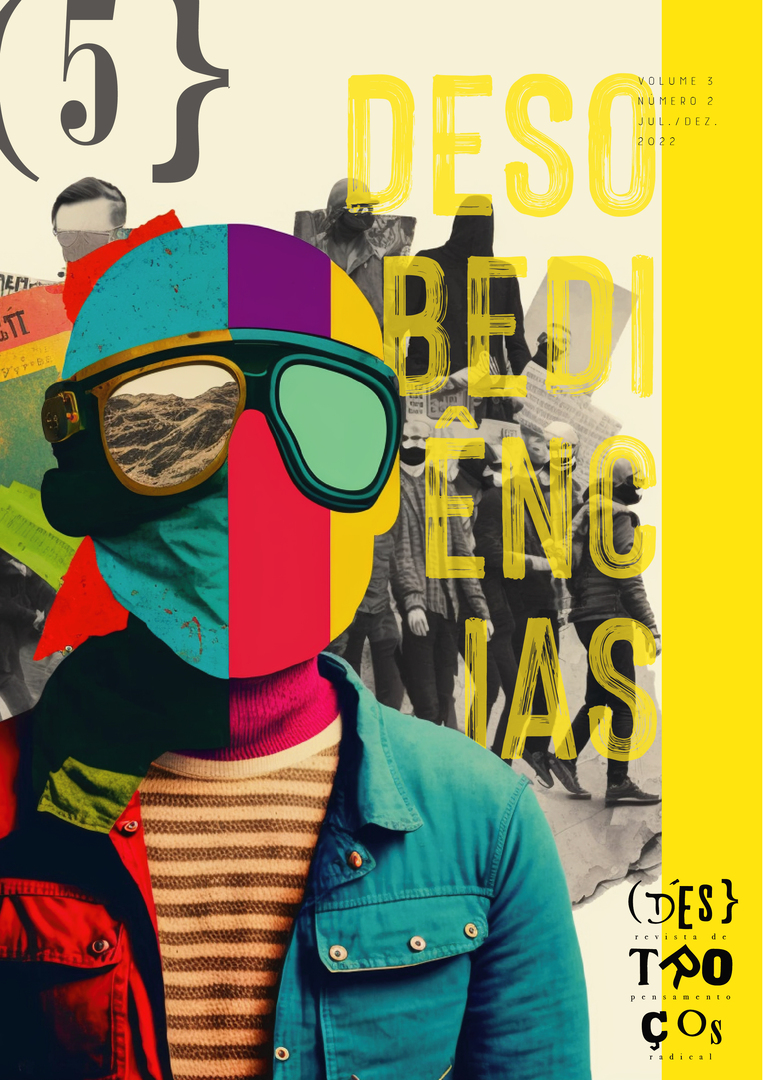Published 2023-04-18
Keywords
- Giorgio Agamben,
- bare life,
- nudity
How to Cite
Copyright (c) 2023 Daniel Arruda Nascimento

This work is licensed under a Creative Commons Attribution-NonCommercial 4.0 International License.
Abstract
In the work of Giorgio Agamben as a whole, but especially in his famous political-philosophical project, the concept of bare life basically appears as the fundamental provision of sovereign power and the original element of the Western legal-political world, in a residual relationship dissected by the threat and by violence. The investigation that takes shape in the reflections that are now summarized has the purpose of elucidating whether there are elements in the philosopher's work that authorize taking another look at bare life, beyond its most evident theoretical conception. Covering the long period that separates Homo sacer: il potere sovrano e la nuda vita from Quando la casa brucia, with twenty-five years of uninterrupted production, we now seek to assess if there is another side to bare life, whether the concept can be observed from another angle, what alternatives it supports, what suggestions it infers, what its potentialities are, both by the elements listed by the author himself and by the meanings that we can construct through independent argumentative paths. Just as for the Italian philosopher, we read in an interview dated from the beginning of this journey, Walter Benjamin’s reading can serve as an antidote to the thought of Martin Heidegger, Giorgio Agamben can perhaps serve as an antidote against himself.
Downloads
References
- AGAMBEN, Giorgio; COSTA, Flávia. Entrevista com Giorgio Agamben. Trad. Susana Scramim. Revista do Departamento de Psicologia da UFF, v. 18, n. 1, jan./jun. 2006.
- AGAMBEN, Giorgio. Altissima povertà: regole monastiche e forma di vita. Vicenza: Neri Pozza, 2011.
- AGAMBEN, Giorgio. Che cos’è un dispositivo?. Roma: Nottetempo, 2006.
- AGAMBEN, Giorgio. Homo sacer: il potere sovrano e la nuda vita. Torino: Einaudi, 1995.
- AGAMBEN, Giorgio. Il regno e il giardino. Vicenza: Neri Pozza, 2019.
- AGAMBEN, Giorgio. Il tempo che resta: un commento alla Lettera ai Romani. Torino: Bollati Boringhieri, 2000.
- AGAMBEN, Giorgio. Il volto e la morte. Quodlibet, 03 mai. 2021. Disponível em https://www.quodlibet.it/giorgio-agamben-il-volto-e-la-morte. Acesso em 27 fev. 2023.
- AGAMBEN, Giorgio. L’aperto: l’uomo e l’animale. Torino: Bollati Boringhieri, 2002.
- AGAMBEN, Giorgio. L’uso dei corpi. Vicenza: Neri Pozza, 2014.
- AGAMBEN, Giorgio. Mezzi senza fine: note sulla politica. Torino: Bollati Boringhieri, 1996.
- AGAMBEN, Giorgio. Nudità. Roma: Nottetempo, 2009.
- AGAMBEN, Giorgio. Quando la casa brucia. Macerata: Giometti & Antonello, 2020.
- AGAMBEN, Giorgio. Un paese senza volto. Quodlibet, 08 out. 2020. Disponível em https://www.quodlibet.it/giorgio-agamben-un-paese-senza-volto. Acesso em 27 fev. 2023.
- BENJAMIN, Walter. Crítica da violência – crítica do poder. In: BENJAMIN, Walter. Documentos de cultura, documentos de barbárie: escritos escolhidos. Trad. Willi Bolle. São Paulo: Cultrix; Universidade de São Paulo, 1986.
- BOEHNER, Philotheus; GILSON, Etienne. História da filosofia cristã: desde as origens até Nicolau de Cusa. Trad. Raimundo Vier. Petrópolis: Vozes, 2012.
- CALVINO, Italo. As cidades invisíveis. Trad. Diogo Mainardi. São Paulo: Companhia das Letras, 2017.
- FRANCISCO DE ASSIS. Escritos e biografias de São Francisco de Assis: crônicas e outros testemunhos do primeiro século franciscano. Petrópolis: Vozes, 2000.
- HAN, Byung-Chul. Sociedade da transparência. Trad. Enio Paulo Giachini. Petrópolis: Vozes, 2017.
- MBEMBE, Achille. Políticas da inimizade. Trad. Marta Lança. Lisboa: Antígona, 2017.
- MERINO, José Antonio. Humanismo franciscano: franciscanismo e mundo atual. Trad. Celso Márcio Teixeira. Petrópolis: FFB, 1999.
- MUNDURUKU, Daniel. Das coisas que aprendi: ensaios sobre o bem-viver. Lorena: UK’A, 2019.
- NASCIMENTO, Daniel Arruda. Agamben contra Agamben: por uma revisão do conceito de vida nua. Revista Sofia, v. 11, n. 02, pp. 01-16, 2022.
- NASCIMENTO, Daniel Arruda. Do fim da experiência ao fim do jurídico: percurso de Giorgio Agamben. São Paulo: LiberArs, 2012.
- NASCIMENTO, Daniel Arruda. Em torno de Giorgio Agamben: sobre a política que não se vê. São Paulo: LiberArs, 2018.
- NASCIMENTO, Daniel Arruda. O filósofo e a pandemia um ano depois: entre uma epidemia inventada e a controversa defesa da vida. (des)troços: Revista de Pensamento Radical, v. 02, n. 01, pp. 251-265, jan./jun. 2021.
- NASCIMENTO, Daniel Arruda. Umbrais de Giorgio Agamben: para onde nos conduz o homo sacer?, São Paulo: LiberArs, 2014.
- SALZANI, Carlo. Nudità e vita. Lo Sguardo: Rivista di Filosofia Online, n. 15, pp. 133-147, 2014.
- VILAÇA, Aparecida. O que significa tornar-se outro? Xamanismo e contato interétnico na Amazônia. Revista Brasileira de Ciências Sociais, v. 15, n. 44, pp. 56-72, 2000.

